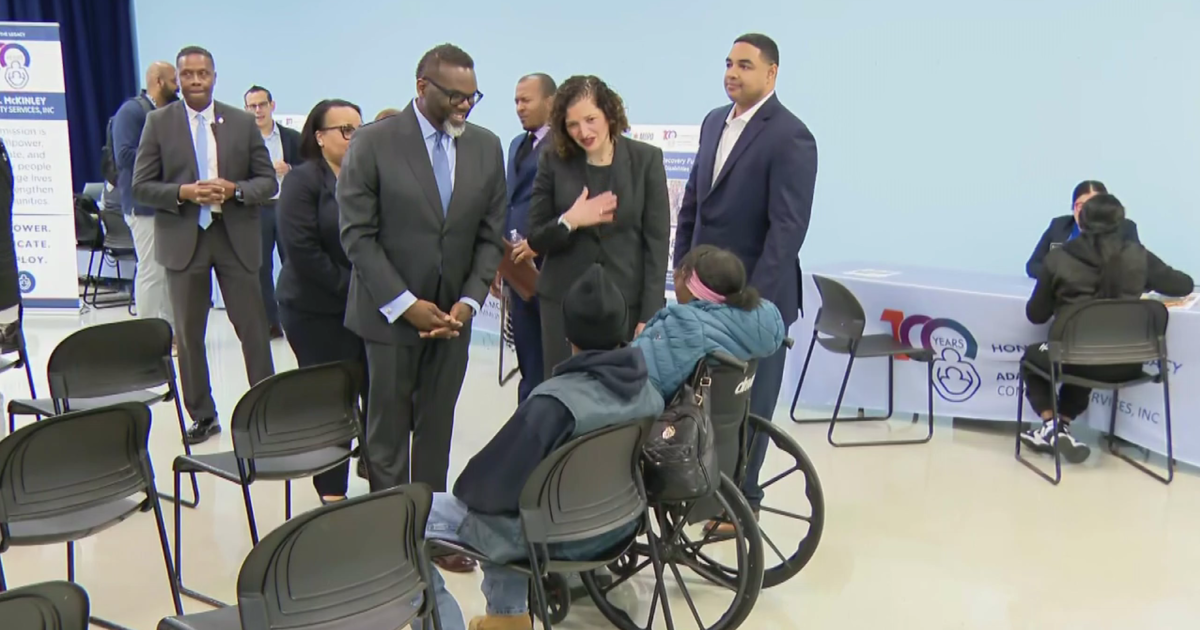Aldermen Approve Mayor Lori Lightfoot's Plan To Update Affordable Housing Requirements For Developers As City Council Resumes In-Person Meetings
CHICAGO (CBS) -- During their first in-person meeting in more than a year, the City Council on Wednesday approved Mayor Lori Lightfoot's plan to overhaul the city's Affordable Requirements Ordinance in an effort to boost the number of affordable homes in Chicago.
Aldermen voted 42-8 to approve the mayor's proposal, which would set new requirements for developers who get city subsidies, purchase city land, or require a zoning change for their projects.
"This significant ordinance will lead to the creation of much-needed affordable housing units across our city," said Ald. Harry Osterman (48th), who chairs the City Council Housing Committee. "The ARO ordinance and the ARO process does not solve all of our housing needs in the city of Chicago, but it is a significant tool in the toolbox, and this ordinance moves our city forward in a very positive direction."
Lightfoot said the changes to the city's affordable housing regulations are designed to address systemic patterns of segregation in Chicago.
"The unfortunate reality is that our city has a dark history of racial segregation, and that history continues to reverberate. Today, as civic leaders, it's up to us to address its modern-day manifestations," she said.
Several progressive aldermen voted against the ordinance, saying while it represents a significant step forward for affordable housing in Chicago, it doesn't go far enough.
"It's disappointing, again, that our real estate industry, our developers, could get their way in a time we were so close to reaching an agreement; an agreement for the families of our communities, the communities most vulnerable and affected by this pandemic," Said Ald. Byron Sigcho-Lopez (25th).
Sigcho-Lopez said he believed a better agreement was within reach to get more affordable family-sized units in Chicago.
Ald. Roberto Maldonado (26th), however, argued taking incremental steps is the only way for the City Council to address the city's shortage of affordable housing.
A mayoral task force that studied ways to improve the city's affordable housing ordinance last year found Chicago has about 120,000 fewer units of affordable housing than what it needs.
"We will never resolve that challenge, that problem, comprehensively. The only way to tackle and to resolve this problem is incrementally," Maldonado said.
Ald. Walter Burnett (27th) said the changes aldermen approved on Wednesday were "the best compromise that we could get at this time."
Chicago's affordable housing rules already require developers who receive a zoning change, city subsidies, or city land to set aside at least 10% of their units at prices affordable to people earning approximately 60% of area median income.
The mayor's proposal would increase the set-aside minimum to 20% downtown, in neighborhoods with low levels of affordable housing, and in neighborhoods facing displacement of low-income residents.
The measure also would reduce the income thresholds for affordable units, so that the required units would have to be affordable to even more people.
While developers would still be able to pay "in-lieu fees" that allow them to build fewer affordable units, the mayor's proposal would allow those fees to cover fewer of the units they would otherwise be required to build. The change would allow for developers to opt out of up to 50% of the required units, down from 75%, while the "In-lieu fees" they must pay to do so would significantly increase.
Developers are also given the option to build affordable units off-site from their project. The mayor's proposal would allow those off-site units to be built in any part of the city lacking in affordable housing or threatened with displacement. Off-site units would have to have at least two bedrooms, in an effort to bolster the number of affordable family-sized units in the city.
The revised affordable housing ordinance also would require that if a development covered by affordable housing rules is built in a transit-oriented development zone, any affordable units built off-site also must be located close to mass transit.
The city also would add incentives to encourage developers to build family-size units by allowing projects with three- and four-bedroom units to have fewer affordable units overall.
Lightfoot, City Clerk Anna Valencia, and 28 aldermen attended Wednesday's meeting in-person, the first time the City Council met in the City Hall chamber since last March, after moving all council and committee meetings online due to the pandemic. The other 22 aldermen attended remotely.
"It's great to see you guys back here today. I feel like it's the first day of school," said Ald. Susan Sadlowski-Garza (10th), a former teacher.
Aldermen happily greeted each other in the chamber, exchanging fist bumps and hugs as they gathered in the Council Chamber, with their seats spread out more than usual, and Ald. Byron Sigcho-Lopez (25th) even sitting in the gallery.
Other than a few hiccups hearing from aldermen participating by video conference, the meeting ran smoothly.
In other business, the City Council also approved:
- Mayor Lightfoot's plan to protect Chicago workers from retaliation if they take time off work to get vaccinated against COVID-19, and to require employers who require staff to get the vaccine to compensate them for doing so. Regardless of whether employers require staff to get vaccinated or not, those who don't allow workers to take time off to get vaccinated, or retaliate against those who do, would face fines of $1,000 to $5,000 per violation. In addition, if workers are fired for taking time off to get the vaccine, they would be entitled to get their job back, plus damages up to three times the amount of lost wages.
- A resolution condemning U.S. Rep. Mary Miller, a downstate Republican, for saying Nazi dictator Adolf Hitler "was right about one thing" during a January rally outside the U.S. Capitol in January. Miller has since apologized for her remarks at a "Save The Republic" rally by the conservative group Moms for America, where she said Republicans need to "win the hearts and minds of our children" in order to avoid losing future elections. "This is the battle. Hitler was right on one thing. He said, 'Whoever has the youth has the future,'" Miller said at the rally on Jan. 5. Aldermen unanimously approved a resolution condemning Miller, and calling her remarks "a disgrace to the memories of those killed in the Holocaust and the millions of victims of World War II, an insult to the families of those who perished, and a discredit to the office of United States Congresswoman and the great State of Illinois."
- A proposal designed to close a loophole in the city's ordinance banning pet stores from selling animals that come from so-called "puppy mills" by essentially setting up fake rescue organizations. Pet shops would be allowed to provide space to animal shelters or rescue organizations to display dogs, cats, and rabbits for adoption for a "nominal adoption fee." However, the stores may not have any financial interest in the shelter or rescue group, and the shelters and rescue groups they partner with also may not have any affiliation with for-profit breeders or pet brokers. The revised puppy mill ordinance would define an animal rescue group as "any nonprofit organization with tax exempt status under 501(c)(3) of the IRS code, whose mission in practice is the rescue and placement of dogs, cats, and rabbits."



